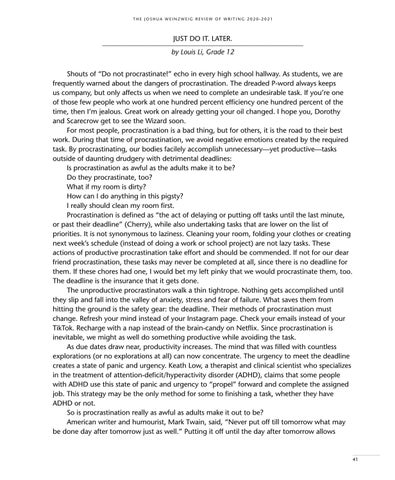THE JOSHUA WEINZWEIG REVIEW OF WRITING 2020-2021
JUST DO IT. LATER. ____________________________________________________________ by Louis Li, Grade 12 Shouts of “Do not procrastinate!” echo in every high school hallway. As students, we are frequently warned about the dangers of procrastination. The dreaded P-word always keeps us company, but only affects us when we need to complete an undesirable task. If you’re one of those few people who work at one hundred percent efficiency one hundred percent of the time, then I’m jealous. Great work on already getting your oil changed. I hope you, Dorothy and Scarecrow get to see the Wizard soon. For most people, procrastination is a bad thing, but for others, it is the road to their best work. During that time of procrastination, we avoid negative emotions created by the required task. By procrastinating, our bodies facilely accomplish unnecessary—yet productive—tasks outside of daunting drudgery with detrimental deadlines: Is procrastination as awful as the adults make it to be? Do they procrastinate, too? What if my room is dirty? How can I do anything in this pigsty? I really should clean my room first. Procrastination is defined as “the act of delaying or putting off tasks until the last minute, or past their deadline” (Cherry), while also undertaking tasks that are lower on the list of priorities. It is not synonymous to laziness. Cleaning your room, folding your clothes or creating next week’s schedule (instead of doing a work or school project) are not lazy tasks. These actions of productive procrastination take effort and should be commended. If not for our dear friend procrastination, these tasks may never be completed at all, since there is no deadline for them. If these chores had one, I would bet my left pinky that we would procrastinate them, too. The deadline is the insurance that it gets done. The unproductive procrastinators walk a thin tightrope. Nothing gets accomplished until they slip and fall into the valley of anxiety, stress and fear of failure. What saves them from hitting the ground is the safety gear: the deadline. Their methods of procrastination must change. Refresh your mind instead of your Instagram page. Check your emails instead of your TikTok. Recharge with a nap instead of the brain-candy on Netflix. Since procrastination is inevitable, we might as well do something productive while avoiding the task. As due dates draw near, productivity increases. The mind that was filled with countless explorations (or no explorations at all) can now concentrate. The urgency to meet the deadline creates a state of panic and urgency. Keath Low, a therapist and clinical scientist who specializes in the treatment of attention-deficit/hyperactivity disorder (ADHD), claims that some people with ADHD use this state of panic and urgency to “propel” forward and complete the assigned job. This strategy may be the only method for some to finishing a task, whether they have ADHD or not. So is procrastination really as awful as adults make it out to be? American writer and humourist, Mark Twain, said, “Never put off till tomorrow what may be done day after tomorrow just as well.” Putting it off until the day after tomorrow allows
–––––––––––––––––––––––––––––––––––––––
41











